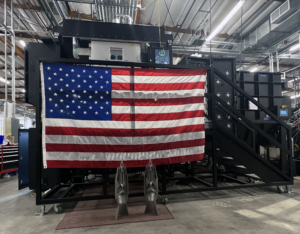
Velo3D Inc., a leading metal additive manufacturing technology company for mission-critical parts, said its Sapphire family of 3D printers is the first to achieve the U.S. Department of Defense’s (DoD) Green-level STIG (Security Technical Implementation Guide) Compliance.
Velo3D printers, such as the one pictured at Velo3D’s Lakeview, California, manufacturing facility, are compliant with the U.S. Department of Defense’s STIG cybersecurity guidelines, giving customers the confidence their additive manufacturing technology is hardened against cyberattacks and other vulnerabilities. All Velo3D printers are designed and manufactured in the U.S.A. to be connected to the DoD’s Secret Internet Protocol Router Network (SIPRNet).
The rigorous qualification process was achieved through collaboration with a third party to generate compliance, vulnerability, and remediation reports from Sapphire printers that measure against security benchmarks.
The testing process confirmed that all Velo3D printers provide the highest network, data, and software security, as well as vulnerability management, reducing the risk of security breaches. This includes Sapphire, Sapphire 1MZ, Sapphire XC, and Sapphire XC 1MZ. Test results indicated Velo3D achieved an average score of 97% on its tests, exceeding the DoD’s threshold of 90% needed to achieve Green-level STIG compliance—the highest level offered.
“Our team at Velo3D strives to go above and beyond to meet our customers’ needs, so when customers that work with the DoD inquired about STIG compliance, we quickly went to work to achieve the highest level of certification available,” said Benny Buller, Velo3D Founder and CEO. “I am proud of our team’s work in achieving this qualification and I am confident this will empower all our customers—but especially those that work with the DoD and other government agencies—to fully leverage the capabilities of our additive manufacturing technology without worrying about the risk of stolen intellectual property.”
In addition to being SIPRNet-ready, Velo3D Sapphire printers can now also connect to the DoD’s Non-classified Internet Protocol Router Network (NIPRNet). STIG compliance is required for DoD agencies and contractors that connect to both networks, as well as networks operated by other branch departments of the federal government.
Without STIG compliance, government agencies and contractors using metal 3D printers were required to keep them disconnected from network connections. This technique—commonly referred to as airgapping—can complicate the process of managing printers. In the case of Velo3D, engineers and printer operators could not fully leverage the capabilities of its fully integrated solution, which enables users to easily monitor the printing of parts, analyze the data generated in the printing process, and transfer print files to and from printers.
Now, with Velo3D, engineers can utilize all aspects of metal additive manufacturing technology when manufacturing parts that are classified or International Traffic in Arms Regulation (ITAR) protected, without risking stolen intellectual property or other cyberattacks.
STIG compliance will also make it easier for defense contractors and agencies to purchase Sapphire printers as they will no longer have to obtain exceptions and other approvals that are required for non-compliant printers. Current Velo3D customers can upgrade its existing Sapphire printers to achieve STIG Green-level security. The software upgrade can be completed with minimal impact on the customer.
